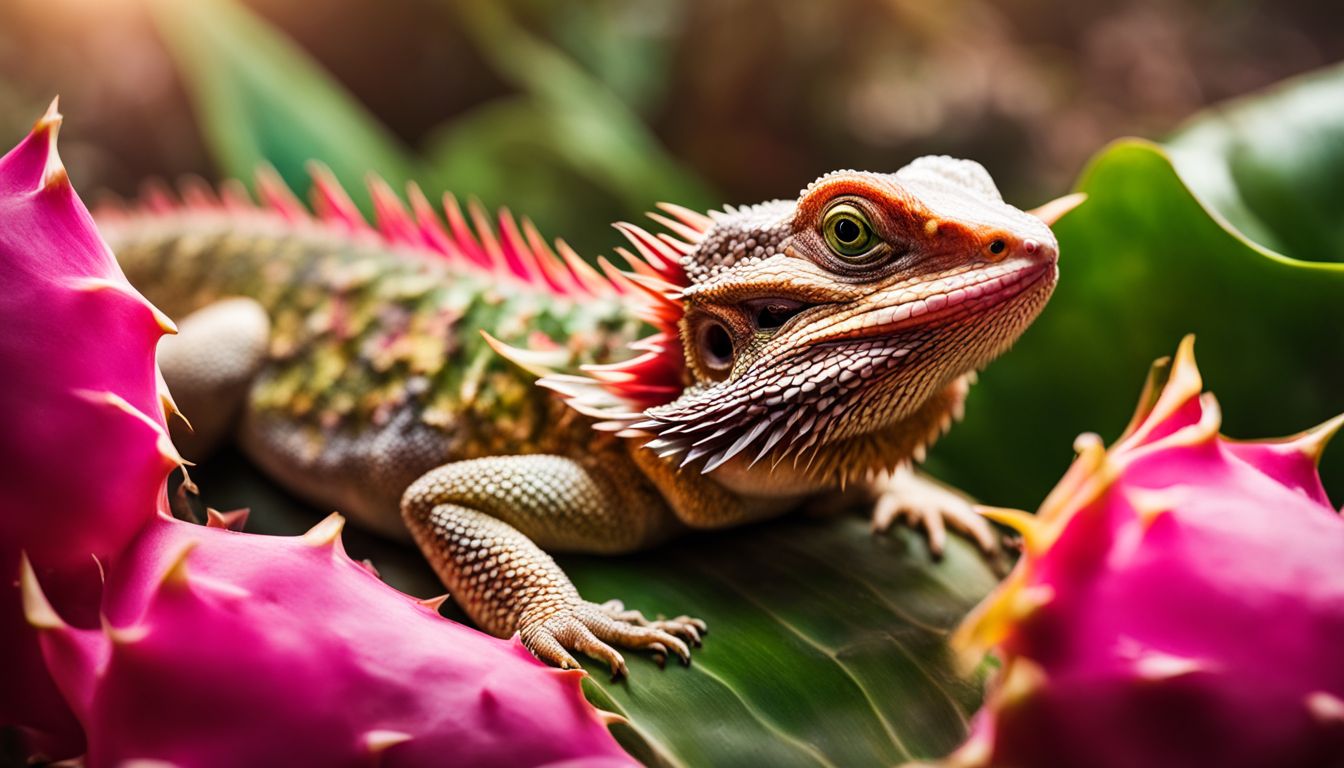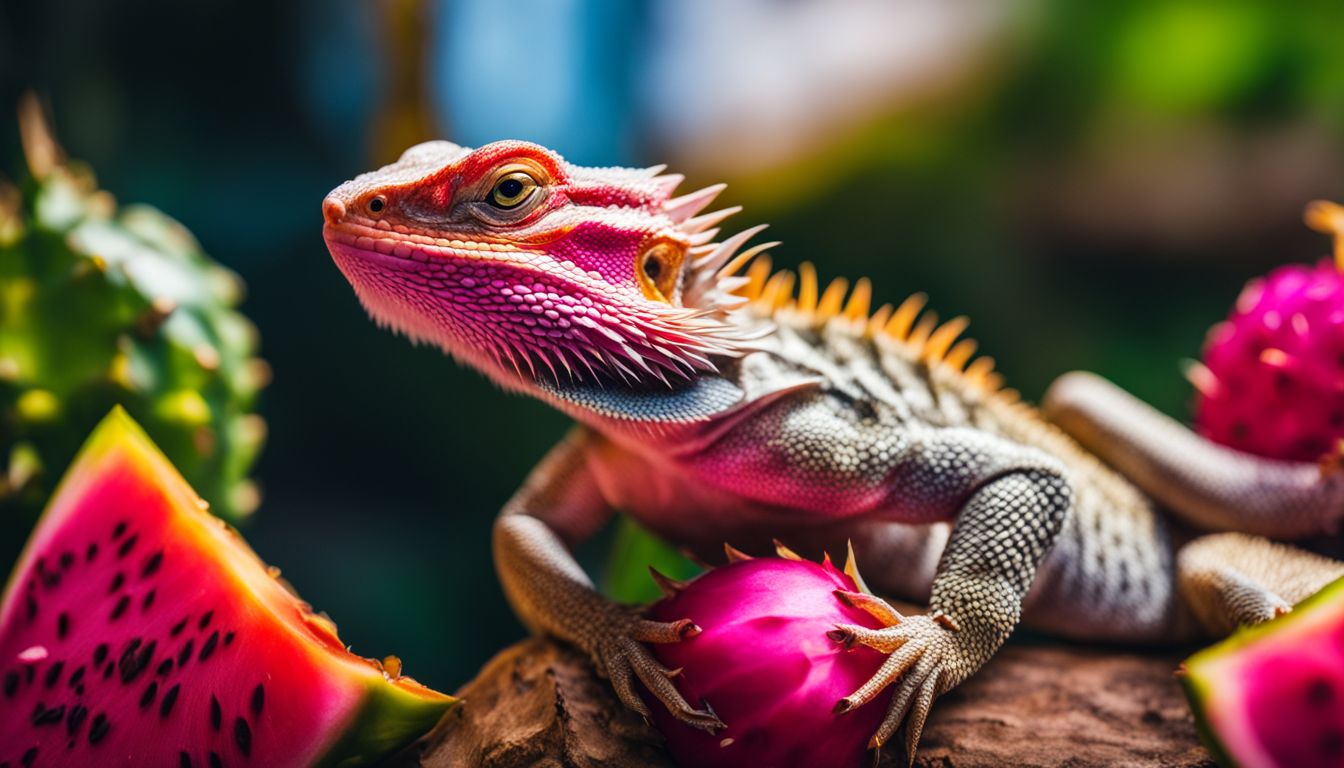Deciding what to feed your bearded dragon can feel like a puzzle sometimes. Did you know that bearded dragons can actually eat dragon fruit? This article will guide you through the benefits and things to watch out for when including dragon fruit in their diet.
Let’s keep reading!
Nutritional Value of Dragon Fruit for Bearded Dragons

Exploring the nutritional landscape of dragon fruit for bearded dragons unveils a fascinating mix of benefits. This exotic fruit, bursting with moisture, offers a refreshing treat. Let’s dissect its components to understand why it’s more than just a colorful addition to their diet.
| Nutrient | Content | Significance for Bearded Dragons |
|---|---|---|
| Water | 80-90g per 100g | Helps with hydration, crucial in arid habitats. |
| Calcium | Low | Essential for bone health, though dragon fruit alone cannot fulfill the requirement. |
| Phosphorus | Higher than calcium | A balanced calcium to phosphorus ratio is vital; supplementation may be necessary. |
| Sugars | Varies | Energy source but should be provided in moderation due to the risk of obesity. |
| Fiber | Small amounts | Aids in digestion, though fruits should not be the primary fiber source. |
Given its high water content, dragon fruit emerges as a hydrating snack for bearded dragons, especially beneficial in mimicking their natural, arid environments. However, it’s the interplay of calcium and phosphorus that demands attention, underscoring the need for a balanced dietary plan. Transitioning smoothly from what dragon fruit contains, let’s delve into how these elements benefit or potentially challenge our scaly friends.
Benefits of Dragon Fruit for Bearded Dragons

Dragon fruit is a safe and tasty treat for bearded dragons, packed with essential nutrients. It provides vitamin C, calcium, and iron—key elements that support their overall health.
These nutrients help boost the immune system, strengthen bones, and improve blood quality in your reptilian friend. The high water content in dragon fruit also aids in hydration, especially beneficial during hot weather or for dragons who might not drink enough water on their own.
Eating the seeds of dragon fruit offers added benefits as they are safe for reptiles and can be digested without issues. This aspect of dragon fruit introduces dietary fiber into their diet which is crucial for proper digestion.
As a bonus, feeding your bearded dragon this exotic fruit can add variety to their diet, keeping mealtime interesting and encouraging them to explore different textures and tastes.
Risks of Feeding Dragon Fruit to Bearded Dragons
Feeding dragon fruit to bearded dragons can lead to health risks such as its high acid content, incorrect calcium to phosphorous ratio, and high sugar content. Learn how to safely feed dragon fruit to your pet reptile in the upcoming blog post!
High acid content
Dragon fruit seeds are packed with linoleic and linolenic acid, making them really sour. This high acidity is a problem for bearded dragons. Just like citrus fruits can upset their stomachs, dragon fruit does the same.
It might seem tasty and exotic, but it’s not the best treat due to its strong acids.
These acidic foods can also cause irritation in your pet’s mouth and stomach lining. Think of it as eating something that gives you heartburn – definitely not pleasant! While dragon fruit looks fun and colorful, its high acid content could lead to digestive issues in bearded dragons, turning a treat into trouble.
Incorrect Calcium to Phosphorous ratio
Dragon fruit has an incorrect calcium-to-phosphorus ratio for bearded dragons. This imbalance can lead to health issues in these reptiles. Be cautious when considering this fruit as part of your bearded dragon’s diet.
High acid content in fruits, including dragon fruit, is a risk for bearded dragons. Additionally, the ideal calcium-to-phosphorus ratio recommended for their diet is 2:1. Therefore, it’s essential to carefully select foods that align with these requirements to maintain your pet’s well-being and health.
High sugar content
Dragon fruit has excessive sugar content, which can lead to obesity and digestive issues in bearded dragons. This high sugar intake can also cause fatty liver, oral health problems, and potential weight management challenges.
Moderation is crucial when it comes to feeding dragon fruit to your beardie to prevent these health risks.
How to Safely Feed Dragon Fruit to Bearded Dragons
Offer dragon fruit as an occasional treat, not a regular part of their diet. Cut it into small, bite-sized pieces to make it easier for them to eat.
Feeding frequency
Bearded dragons should not eat dragon fruit every day. Young ones need to be fed once or twice daily, while adults can go 24-72 hours between meals. Adjust the feeding frequency based on your bearded dragon’s age and growth stage to keep them healthy.
Overfeeding dragon fruit can lead to obesity and dental problems due to its high sugar content.
Preparation methods
Feeding frequency plays a crucial role in maintaining the health of bearded dragons. When it comes to preparation methods, it’s important to follow these guidelines for feeding dragon fruit to your pet. Here’s how to safely prepare and feed dragon fruit to bearded dragons:
- Wash the dragon fruit thoroughly before feeding it to your bearded dragon to remove any pesticides or chemicals that may be present on the skin.
- Cut the dragon fruit into small, bite – sized pieces to make it easier for your pet to consume.
- Remove all seeds from the dragon fruit as they can pose a choking hazard and may not be easily digestible for bearded dragons.
- Offer small amounts of dragon fruit as an occasional treat, making sure not to exceed recommended feeding frequencies.
Conclusion
In conclusion, while bearded dragons can eat dragon fruit in limited amounts, it’s crucial to consider the nutritional balance and potential risks. Despite its enticing water content and vitamins, the high sugar levels may not make it an ideal choice for regular feeding.
Careful consideration of their diet ensures these exotic pets maintain balanced nutrition for optimal health. It’s important to consult a reptile veterinarian when introducing new fruits like dragon fruit into a bearded dragon’s diet to ensure their dietary needs are well met without adverse effects.
For more insights on what your bearded dragon can safely eat, check out our detailed article on whether bearded dragons can eat stink bugs.
FAQs
1. Can bearded dragons eat dragon fruit?
Yes, bearded dragons can eat dragon fruit as an occasional treat due to its high sugar content.
2. How should I prepare dragon fruit for my bearded dragon?
Remove the skin and seeds before offering small pieces of ripe, soft dragon fruit to your pet.
3. Is it safe for baby bearded dragons to eat dragon fruit?
It is not recommended to feed baby bearded dragons with dragon fruit due to their sensitive digestive systems.
4. What are the potential benefits of feeding dragon fruit to my bearded dragon?
Dragon fruit can provide hydration and some essential nutrients like vitamin C when given in moderation.
5. Are there any risks associated with feeding my bearded dragon with dragon fruit?
Overfeeding on high-sugar fruits like dragon fruit may lead to obesity or digestive issues in bearded dragons.



